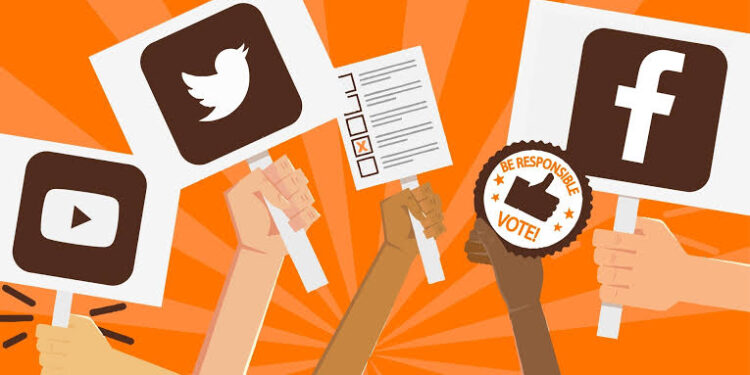The number of active social media users in Nigeria has seen a steady rise over the last two decades; from 200,000 users in the year 2000 to over 32 million in 2022.
Demos in its study of social media and its relationship with the country’s politics has revealed that the use of social media in elections which had initially become noticeable in the 2011 Nigerian elections has now grown to receive widespread media attention in the country.
As a result of the above study, the question, “what is the relationship between social media and Nigeria’s democracy and how do they aid each other’s existence?” comes to play.
The relationship between democracy and social media:
- The first and most important bond both democracy and social media share is their mandate to establish freedom and offer a strong voice to the people. Through social media, people are given the freedom to communicate and socialize with others from far and near. Whereas, democracy offers citizens the right to choose their government and consent to how they are being led.
- Secondly, both institutions share a symbiotic relationship whereby they both check and balance the other. Where democracy gives power to the people in terms of politics and governance, social media forms a bridge between the people and these chosen leaders. While the latter creates the regulations to keep all others in check, social media keeps the populace connected and informed, ensuring transparency and fair play in their everyday existence.
The nature of this relationship in previous years:
Plangkat and Abby are two Nigerians who share a passion for the country’s politics and democracy. They both featured as guests at the last edition of CrestHubChats where they discussed the role of social media in the forthcoming 2023 presidential elections.
Confronted by the question of what obvious impact social media has had on Nigeria’s politics in previous years, Plangkat explained that while social media has transformed and galvanized people to participate more in the political affairs of the federation, nothing has changed about the brutality, misinformation and religious bigotry that is still transmitted through these platforms.
Supporting this notion, Abby said that both offline and online, this was the norm among supporters during every election. She insisted that it isn’t a problem that is peculiar to Nigeria alone as it’s part of the process, everywhere.
The report by Demos also revealed that in a survey of 13.6 million tweets posted by 1.38 million unique users in association with that year’s general elections between 18 March – 22 April 2015, it was found that Twitter was ten times more active over the election period than at ‘normal’ times.
It read, “We generated 12.4 million tweets about the elections over the period; and these tweets tended to be divided into ‘reportage’ (i.e. people describing events) and ‘comment’ (i.e. people commenting on events). By using automated classification, it was possible to break the data down into further useful categories”.
“For example, there was a significant volume of tweets about violence (408,000). Much of the top content was widely shared in news reports or campaigning – which demonstrates the value of a more nuanced analysis of less popular content. While there was a significant volume of rumours being spread on Twitter, we found relatively few cases of ethnic or racial slurs being used”, it added.
Finding solutions to these identified problems:
“The responsibility can be shared because of how closely knit social media has made us. Thus, misinformation can become a serious deal. This is why regulations matter,” Plangkat said.
“A few months ago, the code of conduct was released to regulate social media. Although it’s a double-edged sword, it’s a crucial thing to establish to curtail the toxicity on these platforms,” he added.
Although Abby argued that it is impossible to fully control these reactions, she, however, agreed that there is a need for people to be responsible and held accountable for their actions.
She said, “As long as social media is concerned, it’s all about building relationships and reshaping our democracy and future. We’re already maximizing these platforms and doing the necessary things. I do agree that freedom of speech can wreak havoc but we do not want to shut people up. Therefore, educating and creating awareness among social media users about the correct use of these platforms is very necessary and should be a long-term thing that continues even after the elections”.
Final note
Both Plangkat and Abby strongly emphasized the need for mutual respect among party supporters who go to extremes to show their support.
“The fact that you like one man does not mean you have to shit down other people’s opinions. Regardless of who wins, we’re all going to have to have to come back to the table and work together”, Plangkat said.
(Additional reporting by Mary John)

































